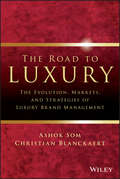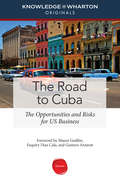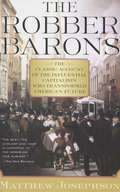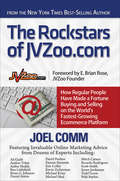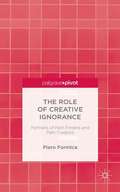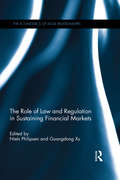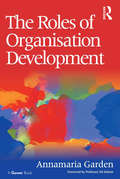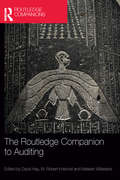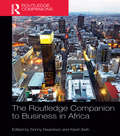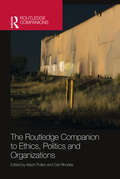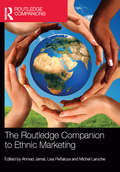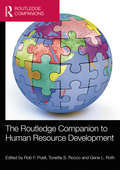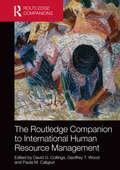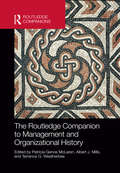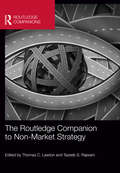- Table View
- List View
The Road To Luxury
by Christian Blanckaert Ashok SomA thorough, comprehensive guide to the luxury goods industry forexecutives, entrepreneurs, and MBA students As key new luxury markets like China and India continue toexpand, this book gives professionals in the industry a holisticunderstanding of luxury market dynamics around the world usingrelevant data and statistics on current market trends. Forinvestors, the book offers valuable insight on where the industryis headed. For industry insiders and executives, it presentsvaluable data with which to craft successful businessstrategies.The definitive insider's guide to the luxury sectorIncludes rigorous academic data, including information on thebusiness attractiveness and appropriateness of various countrymarketsFor professionals in the luxury industry, as well as thosestudying it or investing in it, Luxury presents a completeand information-packed resource covering virtually every aspect ofthis growing sector.
The Road from Mont Pèlerin: The Making of the Neoliberal Thought Collective, With a New Preface
by Philip MirowskiWhat exactly is neoliberalism, and where did it come from? This volume attempts to answer these questions by exploring neoliberalism's origins and growth as a political and economic movement. Now with a new preface.
The Road to Cuba
by Mauro F. Guillén Knowledge Wharton Gustavo Arnavat Faquiry Diaz CalaThe first ebook to examine the opportunities and risks for US business in Cuba since President Barack Obama announced his intention to normalize relationsAfter President Barack Obama's announcement in December 2014, investors, business leaders, and entrepreneurs began asking questions: What will this historic change mean for economic relations between the United States and Cuba? What opportunities-and risks-should US companies consider as they explore the business potential of one of the largest markets in the Caribbean?The Road to Cuba: The Opportunities and Risks for US Business answers those questions and more. In this original in-depth ebook, Knowledge@Wharton, The Wharton School's online journal of business analysis, addresses:Quick-win opportunities: travel and tourism, telecoms, financial services, and food industriesLonger-term prospects: construction and real estate, energy production and mining, manufacturing and retail, pharmaceuticals and biotechnology, and agricultureThe political and economic risks and hurdles: An analysis of what could speed up-or derail-progress in relationsThe Road to Cuba is a comprehensive guide for business leaders in the United States who want to understand the opportunities the Cuban market holds. It is also a must-read for business leaders in Cuba and around the world who want to understand the investment and competition that is on its way.About Knowledge@Wharton BooksInsights and inspiration business leaders can use today-from The Wharton School's online journal of business analysisKnowledge@Wharton Books offer you the signature reporting that Knowledge@Wharton readers have come to expect, including in-depth coverage and analysis of important business trends, accessible explanations of the latest business research, and inspiring conversations with today's thought leaders.Published exclusively as ebooks by Wharton Digital Press, this practical line of books includes two series:Knowledge@Wharton Originals: All-new, in-depth coverage of a timely important and business matter or trend, featuring key takeaways that business leaders and professionals can leverage immediatelyKnowledge@Wharton Essentials: Collects the best of Knowledge@Wharton's reporting on a single topic of significant business concern, laying out the challenges and offering solutionsEach Knowledge@Wharton ebook offers you what you need to address a business challenge or opportunity head on-today.
The Robber Barons: The Classic Account of the Influential Capitalists Who Transformed America's Future
by Matthew Josephson&“The best, the liveliest and most illuminating&” account of Rockefeller, Morgan, and the other men who seized American economic power after the Civil War (The New Republic). John D. Rockefeller, J. P. Morgan, Cornelius Vanderbilt, Andrew Carnegie, E. H. Harriman, Jay Gould, Henry Clay Frick . . . their names carry a powerful historical ring, still echoing today in the countless institutions that are part of their legacy, from universities to museums to banks. But who were the people behind the legends, and how did they rise to their positions of vast wealth and influence in the latter half of the nineteenth century? The Robber Barons is a classic work on the financiers and industrialists of the Gilded Age, who shaped their own era as well as the future of the United States—&“not a mere series of biographies but a genuine history&” (The New York Times Book Review).
The Rockstars of JVZoo.com: How Regular People Have Made a Fortune Buying and Selling on the World's Fastest Growing Ecommerce Platform
by Joel CommWhat Does it Take to Be an Online RockstarJVZoo is an amazing resource for entrepreneurs to turn their knowledge into digital products and recruit hundreds or thousands in their field to promote those products. Whether you are a business consultant, lawyer, real estate agent, or even someone who knows how to build the perfect birdhouse, JVZoo allows you to put your knowledge into a format that can be sold and profited from. While the rest of the world looks for jobs, JVZoo’s members create their own.In the three years that JVZoo has been around, it’s members have generated over $100 million in sales revenue. Our members are mainly people who started making money online as a part-time venture.Rockstars of JVZoo is a compilation of case studies, written by people just like you, people who listened to their inner voices and created jobs for themselves. Everything you are about to read in this book has been achieved by ordinary people who did that one thing that separates entrepreneurs from the rest of society: they took action.
The Role of Consent in Human Trafficking
by Jessica ElliottHuman trafficking is consistently featured on the global political agenda. This book examines the trafficking of adult female victims for sexual exploitation, and specifically the understanding of consent and its influence in the identification and treatment of trafficking victims. Jessica Elliott argues that when applied to situations of human trafficking, migration and sexual exploitation, the notion of consent presents problems which current international laws are unable to address. Establishing the presence of 'coercion' and a lack of consent can be highly problematic, particularly in situations of human trafficking and exploitative prostitution; activities which may be deemed inherently coercive and problematically clandestine. By examining legal definitions of human trafficking in international instruments and their domestic implementation in different countries, the book explores victimhood in the context of exploitative migration, and argues that no clear line can be drawn between those who have been smuggled, trafficked, or 'consensually trafficked' into a situation of exploitation. The book will be great use and interest to students and researchers of migration law, transnational criminal law, and gender studies.
The Role of Creative Ignorance: Portraits of Path Finders and Path Creators
by Piero FormicaThe Role of Creative Ignorance outlines the importance of creative ignorance using narrative examples of innovators and companies worldwide.
The Role of Law and Regulation in Sustaining Financial Markets (The Economics of Legal Relationships)
by Niels Philipsen Guangdong XuThis book explores the role of law and regulation in sustaining financial markets in both developed and developing countries, particularly the European Union, United States and China. The central argument of this book is that law matters for the operation of financial markets, which, in turn, significantly influences the performance of firms, industries, and economies. The Role of Law and Regulation in Sustaining Financial Markets is divided into four parts. Part one addresses the connection between law, financial development, and economic growth. Part two deals with the role of financial regulation, which can be used to correct market failures, such as negative externalities, information asymmetries, and monopolies. Part three focuses on the design, functioning, and performance of different financial instruments. Part four examines the topic of Corporate Social Responsibility. This book contributes to the ‘law and finance’ literature by studying certain conventional issues, such as the relationship between finance and economic growth, and the effects of regulatory quality on financial development, from new perspectives and/or with new evidence, data, and cases. It also explores novel topics, such as project finance contracts, insurance and climate change, the shadow banking system, that have been overlooked in current literature. This book is meaningful not only for the EU and the US, which have suffered considerably from the financial crisis of 2008, but also for China, which is struggling to build a sound institutional infrastructure to govern its increasingly complicated financial system. By comparing the regulatory philosophies and practices of the EU, the US and China, this book will help the reader to understand the diverse nature of the global ‘law and finance’ nexus and avoid succumbing to the myth of "one size fits all".
The Role of Regional Organizations in Disaster Risk Management
by Simon HollisThe use of regional organizations to mitigate and respond to disasters has become a global trend. This book examines the role regional organizations play in managing disaster risk through a comparative study of ten regional organizations, demonstrating their current limitations and future potential.
The Role of Service in the Tourism & Hospitality Industry: Proceedings of the Annual International Conference on Management and Technology in Knowledge, Service, Tourism & Hospitality 2014 (SERVE 2014), Gran Melia, Jakarta, Indonesia, 23-24 August 2014
by Ford Lumban Gaol Fonny HutagalungThis proceedings volume contains papers presented at the 2014 International Conference on Management and Technology in Knowledge, Service, Tourism & Hospitality (SERVE 2014), covering a wide range of topics in the fields of knowledge and service management, web intelligence, tourism and hospitality. This overview of current state of affair
The Roles of Organisation Development
by Annamaria GardenThe Roles of Organisation Development by Dr Annamaria Garden introduces a radically new and original framework to explain organisation development work and how it is done. The origin of the book came out of a question asked by a woman OD practitioner: How do you do what you do? This book is Dr Garden’s answer to that question. Dr Garden found that she did not think in terms of formal roles or roles as typically described in the organisational development or management literature. Instead, she described what she did in terms of: the Seer, Translator, Cultivator, Catalyst, Navigator, Teacher, Guardian. These are presented primarily as roles for OD people but managers would be wise to adopt them also. They are current across the world in any organisation. Garden was trained in her PhD from MIT by two of the founding fathers of OD: Professor Ed Schein and Professor Dick Beckhard. The book refers, in places, to their teaching and interaction. The Roles of Organisation Development will appeal to OD, strategy and marketing consultants, academics as well as managers doing OD work, and trying to move and change the organisation leaning on the soft skills.
The Routledge Companion to Auditing (Routledge Companions in Business, Management and Accounting)
by David Hay W. Robert Knechel Marleen WillekensAuditing has been a subject of some controversy, and there have been repeated attempts at reforming its practice globally. This comprehensive companion surveys the state of the discipline, including emerging and cutting-edge trends. It covers the most important and controversial issues, including auditing ethics, auditor independence, social and environmental accounting as well as the future of the field. This handbook is vital reading for legislators, regulators, professionals, commentators, students and researchers involved with auditing and accounting. The collection will also prove an ideal starting place for researchers from other fields looking to break into this vital subject.
The Routledge Companion to Business in Africa (Routledge Companions in Business, Management and Accounting)
by Kevin Ibeh Sonny NwankwoAlthough the world's poorest inhabited continent, Africa has recently shown signs of being a source of economic growth in the coming decades, with increased foreign investment - notably from China - and huge growth in GDP from a number of African states. In contrast to the heaving weight of books focusing on business opportunities in Asia, Eastern Europe and Latin America, Africa has been poorly served by academic publishing. This compendium of scholarship offers cutting-edge knowledge relating to business in Africa. The objectives of this collection include: To shed new light on the socio-cultural and historical underpinnings of business practice in Africa and their implications for promoting entrepreneurship and business behaviour in the region To consider the important constraints on business activities in Africa, and the emerging 'best practice' for redressing their real and potential impacts To facilitate a better understanding of contemporary business practice in Africa through the application of relevant theories and models, including emergent ones. The Routledge Companion to Business in Africa is a comprehensive reference resource that provides the perfect platform for embarking on research and study into Africa from the business perspective.
The Routledge Companion to Cross-Cultural Management (Routledge Companions in Business, Management and Accounting)
by Susanne Tietze Nigel Holden Snejina MichailovaThis Routledge Companion provides a timely and authoritative overview of cross-cultural management as an academic domain and field of practice for academics and students. With contributions from over 60 authors from 20 countries, the book is organised in to five thematic areas: Review, survey and critique Language and languages: moving from the periphery to the core Cross-cultural management research and education The new international business landscape Rethinking a multidisciplinary paradigm. Edited by an international team of scholars and featuring contributions from a range of leading cross-cultural management experts, this prestigious volume represents the most comprehensive guide to the development and scope of cross-cultural management as an academic discipline.
The Routledge Companion to Entrepreneurship (Routledge Companions in Business and Management)
by Friederike Welter Ted BakerResearch in entrepreneurship has been booming, with perspectives from a range of disciplines and numerous developing schools of thought. It can be difficult for young scholars and even long-time researchers to find their way through the lush garden of ideas we see before us. The purpose of this book is to map the research terrain of entrepreneurship, providing the perfect starting point for new and existing researchers looking to explore. Topics covered range from emerging perspective, through issues at the core of the field to innovative methodologies. Starting off with a preface by Bill Gartner, each section of the book brings together a world class set of established leading researchers and rising stars. This considered, comprehensive and conclusive companion integrates the recent debates in entrepreneurship research under one cover, to provide a resource which will be useful across disciplinary boundaries and for a whole range of students and researchers.
The Routledge Companion to Ethics, Politics and Organizations (Routledge Companions in Business, Management and Accounting)
by Alison Pullen Carl RhodesThe Routledge Companion to Ethics, Politics and Organizations synthesizes and extends existing research on ethics in organizations by explicitly focusing on ‘ethico-politics’ - where ethics informs political action. It draws connections between ethics and politics in and around organizations and the workplace, examines cutting-edge areas and sets the scene for future research. Through a wealth of international and multidisciplinary contributions this volume considers the broad range of ways in which ethics and politics can be conceived and understood. The chapters look at various ethical traditions, as well as the discursive deployment of ethical terminology in organizational settings, and they also examine large scale political structures and processes and how they relate to different forms of politics which affect behaviour in organizations. These many possibilities are united by a focus on how ethics can be used to inform and justify the exercise of power in organizations. This collection will be a valuable reference source for students and researchers across the disciplines of organizational studies, ethics and politics.
The Routledge Companion to Ethnic Marketing (Routledge Companions in Business, Management and Accounting)
by Ahmad Jamal Lisa Peñaloza Michel LarocheThe globalization of marketing has brought about an interesting paradox: as the discipline becomes more global, the need to understand cultural differences becomes all the more crucial. This is the challenge in an increasingly international marketplace and a problem that the world's most powerful businesses must solve. From this challenge has grown the exciting discipline of ethnic marketing, which seeks to understand the considerable opportunities and challenges presented by cultural and ethnic diversity in the marketplace. To date, scholarship in the area has been lively but disparate. This volume brings together cutting-edge research on ethnic marketing from thought leaders across the world. Each chapter covers a key theme, reflecting the increasing diversity of the latest research, including models of culture change, parenting and socialization, responses to web and advertising, role of space and social innovation in ethnic marketing, ethnic consumer decision making, religiosity, differing attitudes to materialism, acculturation, targeting and ethical and public policy issues. The result is a solid framework and a comprehensive reference point for consumer researchers, students, and practitioners.
The Routledge Companion to Financial Accounting Theory (Routledge Companions in Business and Management)
by Stewart JonesFinancial accounting theory has numerous practical applications and policy implications, for instance, international accounting standard setters are increasingly relying on theoretical accounting concepts in the creation of new standards; and corporate regulators are increasingly turning to various conceptual frameworks of accounting to guide regulation and the interpretation of accounting practices. The global financial crisis has also led to a new found appreciation of the social, economic and political importance of accounting concepts generally and corporate financial reporting in particular. For instance, the fundamentals of capital market theory (i.e. market efficiency) and measurement theory (i.e. fair value) have received widespread public and regulatory attention. This comprehensive, authoritative volume provides a prestige reference work which offers students, academics, regulators and practitioners a valuable resource containing the current scholarship and practice in the established field of financial accounting theory.
The Routledge Companion to Human Resource Development (Routledge Companions in Business, Management and Accounting)
by Tonette S. Rocco Rob F. Poell Gene L. RothThe field of Human Resource Development (HRD) has grown in prominence as an independent discipline from its roots in both management and education since the 1980s. There has been continual debate about the boundaries of HRD ever since. Drawing on a wide and respected international contributor base and with a focus on international markets, this book provides a thematic overview of current knowledge in HRD across the globe. The text is separated into nine sections which explore the origins of the field, adjacent and related fields, theoretical approaches, policy perspectives, interventions, core issues and concerns, HRD as a profession, HRD around the world, and emerging topics and future trends. An epilogue rounds off the volume by considering the present and future states of the discipline, and suggesting areas for further research. The Routledge Companion to Human Resource Development is an essential resource for researchers, students and HRD professionals alike.
The Routledge Companion to Humanitarian Action
by Roger Mac Ginty Jenny H PetersonThe Companion on Humanitarian Action addresses the political, ethical, legal and practical issues which influence reactions to humanitarian crisis. It does so by exploring the daily dilemmas faced by a range of actors, including policy makers, aid workers, the private sector and the beneficiaries of aid and by challenging common perceptions regarding humanitarian crisis and the policies put in place to address these. Through such explorations, it provides practitioners and scholars with the knowledge needed to both understand and improve upon current forms of humanitarian action. The Companion will be of use to those interested a range of humanitarian programmes ranging from emergency medical assistance, military interventions, managing refugee flows and the implementation of international humanitarian law. As opposed to addressing specific programmes, it will explore five themes seen as relevant to understanding and engaging in all modes of humanitarian action. The first section explores varying interpretations of humanitarianism, including critical historical and political-economic explanations as well as more practice based explorations focused on notions needs assessments and evaluation. Following this, readers will be exposed to the latest debates on a range of humanitarian principles including neutrality and sovereignty, before exploring the key issues faced by the main actors involved in humanitarian crisis (from international NGOs to local community based organizations). The final two sections address what are seen as key dilemmas in regards to humanitarian action and emerging trends in the humanitarian system, including the increasing role of social media in responding to crises. Whilst not a ‘how to guide’, the Companion contains many practical insights for policy makers and aid workers, whilst also offering analytical insights for students of humanitarian action. Indeed, throughout the book, readers will come to the realization that understanding and improving humanitarian action simultaneously requires both active critical reflection and an acceptance of the urgency and timeliness of action that is required for humanitarian assistance to have an impact on vital human needs. Exploring a sector that is far from homogenous, both practitioners and scholars alike will find the contributions of this book offers them a deeper understanding of the motivations and mechanics of current interventions, but also insight into current changes and progress occurring in the field of humanitarian practice.
The Routledge Companion to International Entrepreneurship (Routledge Companions in Business, Management and Accounting)
by Stephanie A. Fernhaber Shameen PrashanthamThe domain of international entrepreneurship has continued to gain momentum in an era that sees entrepreneurship and globalization as critical issues in the world of business. Given the flourish of new research in this area, there is a need to provide an up-to-date perspective on the field and its future. This volume draws together a team of experts purposely selected from both the entrepreneurship and international business fields to present a comprehensive resource on the cutting-edge conversations within international entrepreneurship. This prestigious reference book will offer students and researchers an introduction to leading scholarship in international entrepreneurship and also serve as a catapult for future research.
The Routledge Companion to International Human Resource Management (Routledge Companions in Business and Management)
by David G. Collings, Geoffrey T. Wood and Paula M. CaligiuriInternational human resource management (IHRM) is a key area of research in the sphere of international business and management. Described as a field in its infancy in the 1980s, IHRM has quickly advanced through adolescence and into maturity. Today, it is a vibrant and diverse discipline which boasts a large and active body of researchers across the globe. This volume examines cutting-edge themes, with the input of contributions from both established and emerging scholars. The Routledge Companion to International Human Resource Management gives a state-of-the-art overview of the key themes, topics and debates in the discipline, with valuable insights into directions for future research. Drawing on a large and respected international contributor base and with its focus on mature and emerging markets, this book is an essential resource for researchers, students and IHRM professionals alike.
The Routledge Companion to Management and Organizational History (Routledge Companions in Business, Management and Accounting)
by Albert J. Mills Patricia Genoe McLaren Terrance G. WeatherbeeThe field of management and organizational history has reached a level of maturity that means an overview is long overdue. Written by a team of globally renowned scholars, this comprehensive companion analyses management and organizational history, reflecting on the most influential periods and highlighting gaps for future research. From the impact of the Cold War to Global Warming, it examines the field from a wide array of perspectives from humanities to the social sciences. Covering the entire spectrum of the field, this volume provides an essential resource for researchers of business and management.
The Routledge Companion to Non-Market Strategy (Routledge Companions in Business, Management and Accounting)
by Thomas C. Lawton Tazeeb S. RajwaniIt is commonplace for today’s transnational enterprises to undertake political risk analysis when choosing foreign markets and creating entry strategies. Despite this, non-market elements of corporate strategy are less well researched than the traditional market-based perspectives. Providing comprehensive and leading edge overviews of current scholarship, this Companion surveys the current state of the field and provides a basis for improving our understanding of the non-market environment, encouraging new insights to improve strategies for enhancing a firm’s performance and legitimacy. With a foreword by David Baron, the international team of contributors includes Jean-Philippe Bonardi, Bennet Zelner, and Jonathan Doh, who combine to create a book that is essential reading for students and researchers in business, management, and politics, including those interested in business regulation, environmental policy, political risk and corporate social responsibility.
The Routledge Handbook of Environmental Economics in Asia (Routledge International Handbooks)
by Shunsuke ManagiProblems of climate change, biodiversity and air pollution are clearly growing globally, but more particularly in Asia because of its economic importance and richness in nature. The increasing interest in environmental and resource economics applied in regions of Asia will make this book an outstanding resource to the existing literature, particularly in the fields of environmental and resource economics and the integration of applied content in traditional and agricultural development. At present there is no single handbook or text on the state of current knowledge in environmental economics in Asia or one which offers a comprehensive guide to students and academics on the subjects of environmental economics research. This book will help to fill the gap in the existing literature.
